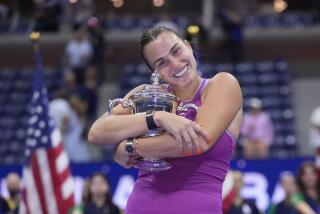Myskina Gets a Dream Win Over Dementieva
- Share via
PARIS — Anastasia Myskina of Russia was like the hard-charging character played by Holly Hunter in “Broadcast News,” the career woman who would unplug the phone every morning, have a good cry and then calmly get down to business.
You would have never known sixth-seeded Myskina had been in tears in the locker room about 20 minutes before her first Grand Slam final. Not the way she methodically dismantled her countrywoman, No. 9 Elena Dementieva, 6-1, 6-2, in 58 minutes Saturday in the French Open final, the first all-Russian Grand Slam.
The lackluster final almost made last year’s all-Belgian contest between winner Justine Henin-Hardenne and Kim Clijsters look competitive. It wasn’t.
For Myskina, it all started with a nightmare and tears.
“I had a dream last night that I lost the match,” she said. I woke and said, ‘Come on.’ That’s the first time I ever played a match in my dreams.”
For Dementieva, the nightmare started when she stepped on the court. And it ended in tears.
Dementieva double-faulted 10 times and committed 33 unforced errors. She hit three doubles in her first service game. Her troubles did not fade. In the second set, she screamed in Russian after double-faulting.
“I said, ‘I hate my serve,’ ” Dementieva said. “Which is true.”
Dementieva is nothing but honest. Her serve is a liability, and the awkward, almost side-arm motion and erratic toss on her second is downright painful-looking. Her camp was greeted on the morning of her first Grand Slam final with a tough but accurate analysis of the serve in the respected French sports daily newspaper L’Equipe: “Dementieva, Out of Order.”
Former No. 1 Martina Hingis, winner of five Grand Slam singles titles, was asked what it was like to have your serve go missing. “You ask Anna Kournikova, I don’t know,” Hingis told reporters.
The buzz around Roland Garros was one of astonishment. How can a player at such a high level have such a lousy serve? After the loss, she was asked about her serve, and hypothetically, how good could she be, already possessing superb ground strokes, if her serve was better.
Always beware the hypothetical.
“I mean, if I can play the final in a Grand Slam without serve, you know, I don’t know how to serve,” Dementieva said, crying.
The pregnant pause during her tears was indeed painful. Then the topic moved away from the serve and to her closeness with Myskina and how difficult it was to play against her childhood friend.
Dementieva later said she would have preferred to face someone else, saying: “I think [Jennifer] Capriati could win, but she was too excited after she won against Serena [Williams]. So maybe it was better for me to play against Jennifer today.”
This was why Myskina’s celebration was muted when Dementieva’s forehand return sailed out, ending the misery, of sorts.
“I really respect her,” Myskina said. “You can’t really show your emotion when your friend is upset. Then the situation was kind of strange. I won and then everyone was so quiet, I really didn’t know what happened there. After a couple of seconds you realize you won the whole match and the tournament.”
Myskina got all of her visible nerves out of the way before stepping on the court, though she said she was “shaking inside.” Earlier, she had been crying and the tour health care provider, Deb Lenaghan of Australia, told her how to relax.
“They explain what you should do when you’re nervous,” Myskina said. “She just told me I should breathe. Some easy, really simple stuff, but it really helps when you’re like this.
“It was the first time I ever [cried before a match], but I played the first-time ever French Open finals. You don’t really have much experience to play those matches.”
Myskina’s on-court demeanor seemed to grow calmer as she progressed through the tournament. Her coach, Jens Gerlach, said she broke a racket in a three-set victory over Alicia Molik of Australia in the first round, and smashed two more in a fourth-round win over Svetlana Kuznetsova of Russia, in which she saved a match point when Kuznetsova netted a forehand.
Gerlach said the turning point was the Venus Williams match in the quarterfinals. Myskina beat Williams, 6-3, 6-4, and crushed Capriati in the semifinals, 6-2, 6-2. Her calm behavior was a marked departure from the last Grand Slam tournament, when she gave Gerlach some verbal blasts from the court at the Australian Open.
Myskina alluded to her past during the trophy presentation, saying to her supporters: “I’m a hard person, sorry for everything.”
On this day, Myskina could have been apologizing for the lousy final, too.
*
The WTA will finalize its 2005 calendar during Wimbledon, including the location of the season-ending championships, said WTA chief executive Larry Scott.
The event has been at Staples Center the last two years and will be held there again in November. It could move to China next year. The season-ending tournament for the men is in Houston this year and will move to Shanghai in 2005.
More to Read
Go beyond the scoreboard
Get the latest on L.A.'s teams in the daily Sports Report newsletter.
You may occasionally receive promotional content from the Los Angeles Times.











